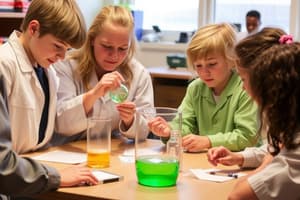Podcast
Questions and Answers
What is the primary focus of integrated science?
What is the primary focus of integrated science?
- The theoretical aspects of scientific research.
- The integration of various scientific disciplines. (correct)
- The application of scientific knowledge in a laboratory setting.
- The study of a single scientific discipline.
Which discipline is NOT explicitly mentioned as part of integrated science?
Which discipline is NOT explicitly mentioned as part of integrated science?
- Earth Science
- Biology
- Philosophy (correct)
- Chemistry
Which of the following is an example of systems thinking in integrated science?
Which of the following is an example of systems thinking in integrated science?
- Studying the characteristics of a specific chemical compound.
- Reading textbooks without hands-on application.
- Analyzing how human activities impact ecosystem balance. (correct)
- Conducting a single experiment in a biology lab.
What teaching approach emphasizes working on projects that require knowledge from multiple scientific fields?
What teaching approach emphasizes working on projects that require knowledge from multiple scientific fields?
What is a significant challenge of integrated science education?
What is a significant challenge of integrated science education?
How does integrated science prepare students for real-world challenges?
How does integrated science prepare students for real-world challenges?
Which of the following accurately describes an application of integrated science?
Which of the following accurately describes an application of integrated science?
Which assessment technique is emphasized in integrated science?
Which assessment technique is emphasized in integrated science?
Flashcards are hidden until you start studying
Study Notes
Definition
- Integrated science is a multidisciplinary approach that combines concepts from various scientific disciplines.
- It emphasizes the interconnectedness of scientific principles and real-world applications.
Key Disciplines Involved
- Biology: Study of living organisms and life processes.
- Chemistry: Investigation of substances, their properties, and reactions.
- Physics: Examination of matter, energy, and the fundamental forces of nature.
- Earth Science: Study of the Earth, its structure, processes, and atmosphere.
- Environmental Science: Focus on the interactions between humans and the environment.
Core Concepts
- Systems Thinking: Understanding how parts of a system interact and affect one another.
- Scientific Inquiry: Involves observing, questioning, hypothesizing, experimenting, and concluding.
- Interdisciplinary Connections: Highlights how different scientific fields overlap and integrate.
Importance
- Promotes critical thinking and problem-solving skills.
- Encourages collaborative learning and teamwork.
- Prepares students for real-world challenges by applying scientific knowledge across disciplines.
Applications
- Environmental Management: Combines ecology, chemistry, and geology to address environmental issues.
- Health Sciences: Integrates biology and chemistry for advancements in medical research.
- Engineering: Merges physics and materials science for innovative technology solutions.
Teaching Approaches
- Project-Based Learning: Students work on projects that require knowledge from multiple scientific fields.
- Experiential Learning: Hands-on experiments and field studies to apply integrated science concepts.
- Collaborative Learning: Group activities that encourage sharing of knowledge and skills across disciplines.
Assessment Techniques
- Use of interdisciplinary assessments that test knowledge from multiple science areas.
- Emphasis on practical applications and real-world problem solving.
- Evaluation of projects and presentations that demonstrate integrated understanding.
Challenges
- Requires educators to have a comprehensive understanding of multiple disciplines.
- May be difficult to create curriculum that adequately covers all aspects of integrated science.
- Assessment of student understanding can be complex due to the interdisciplinary nature.
Definition
- Integrated science is a multidisciplinary approach merging concepts across various scientific fields.
- It highlights the interconnectedness of scientific principles and their practical applications.
Key Disciplines Involved
- Biology: Focuses on living organisms and their life processes, exploring ecosystems and species interactions.
- Chemistry: Examines the properties, composition, and reactions of substances, laying the groundwork for materials science and biochemistry.
- Physics: Studies matter, energy, and fundamental forces, ensuring foundational knowledge for engineering and technological applications.
- Earth Science: Investigates the Earth's structure, processes (like plate tectonics), and atmosphere, crucial for understanding climate change.
- Environmental Science: Explores the relationship between humans and their environment, aiming to solve global environmental challenges.
Core Concepts
- Systems Thinking: Pertains to analyzing how components within a system interact and influence each other.
- Scientific Inquiry: A process involving observation, questioning, hypothesizing, experimenting, and concluding to understand phenomena.
- Interdisciplinary Connections: Showcases the overlaps between different scientific fields, enhancing holistic understanding.
Importance
- Fosters critical thinking and problem-solving abilities essential for tackling complex issues.
- Promotes collaborative learning, enhancing teamwork skills and collective knowledge-building.
- Equips students with practical skills to address real-world challenges by applying integrated scientific knowledge.
Applications
- Environmental Management: Utilizes principles from ecology, chemistry, and geology to confront environmental issues sustainably.
- Health Sciences: Blends biology and chemistry, leading to breakthroughs in medical therapies and public health strategies.
- Engineering: Combines physics and materials science, driving innovations in technology and infrastructure.
Teaching Approaches
- Project-Based Learning: Engages students in multidisciplinary projects, reinforcing their ability to synthesize knowledge from different areas.
- Experiential Learning: Implements hands-on experiments and field studies for practical application of integrated science concepts.
- Collaborative Learning: Facilitates group activities that encourage knowledge sharing and skills integration across disciplines.
Assessment Techniques
- Incorporates interdisciplinary assessments that evaluate knowledge spanning multiple scientific domains.
- Stresses practical applications and real-world problem solving to demonstrate applied understanding.
- Involves evaluation of projects and presentations that highlight integrated comprehension of scientific principles.
Challenges
- Demands educators possess in-depth knowledge across several scientific disciplines to teach effectively.
- Creating a curriculum that balances depth and breadth in all aspects of integrated science can be challenging.
- Assessing student understanding poses complexity due to the interwoven nature of scientific fields.
Studying That Suits You
Use AI to generate personalized quizzes and flashcards to suit your learning preferences.




